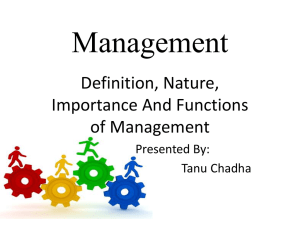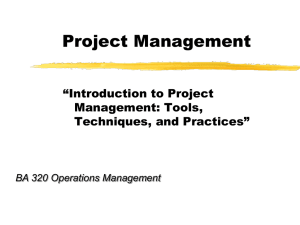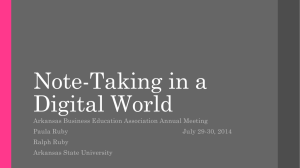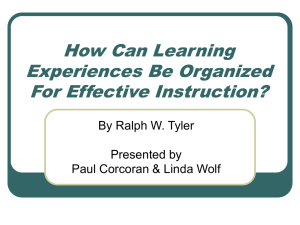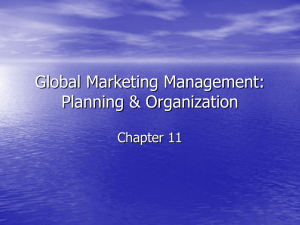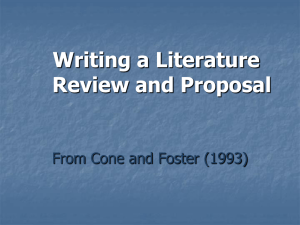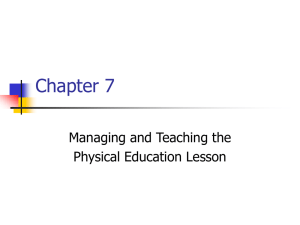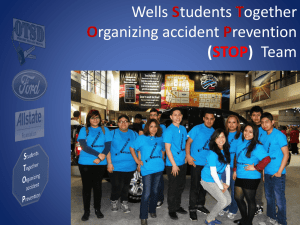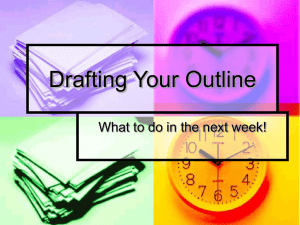Grassroots Community Organizing Alumni 2012
advertisement
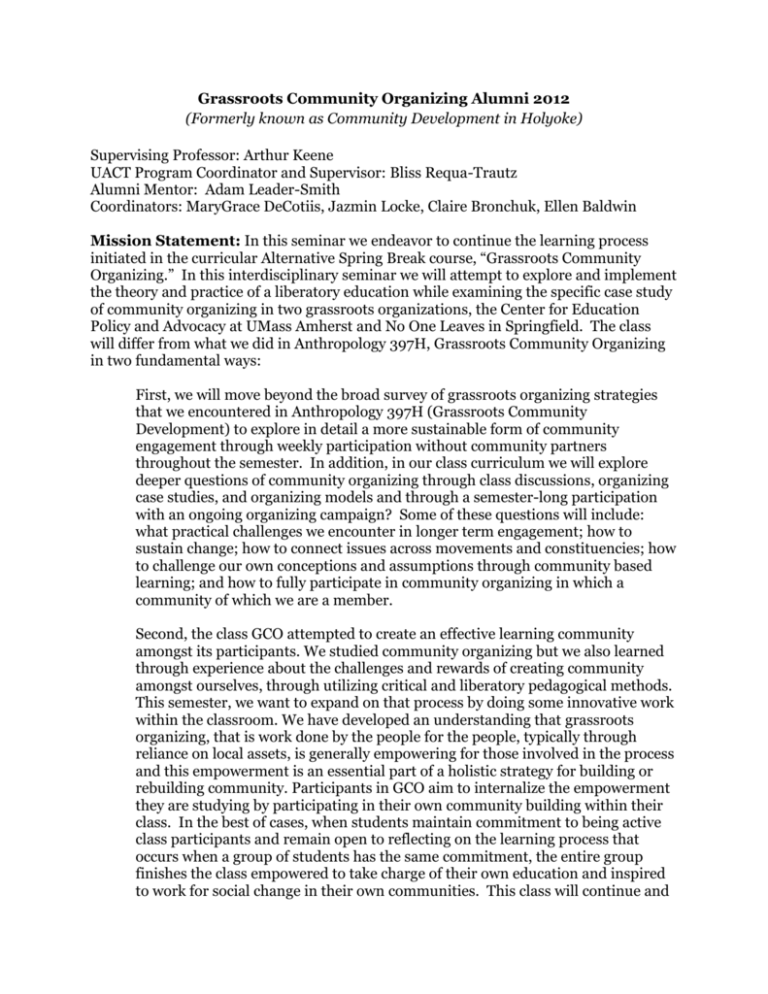
Grassroots Community Organizing Alumni 2012 (Formerly known as Community Development in Holyoke) Supervising Professor: Arthur Keene UACT Program Coordinator and Supervisor: Bliss Requa-Trautz Alumni Mentor: Adam Leader-Smith Coordinators: MaryGrace DeCotiis, Jazmin Locke, Claire Bronchuk, Ellen Baldwin Mission Statement: In this seminar we endeavor to continue the learning process initiated in the curricular Alternative Spring Break course, “Grassroots Community Organizing.” In this interdisciplinary seminar we will attempt to explore and implement the theory and practice of a liberatory education while examining the specific case study of community organizing in two grassroots organizations, the Center for Education Policy and Advocacy at UMass Amherst and No One Leaves in Springfield. The class will differ from what we did in Anthropology 397H, Grassroots Community Organizing in two fundamental ways: First, we will move beyond the broad survey of grassroots organizing strategies that we encountered in Anthropology 397H (Grassroots Community Development) to explore in detail a more sustainable form of community engagement through weekly participation without community partners throughout the semester. In addition, in our class curriculum we will explore deeper questions of community organizing through class discussions, organizing case studies, and organizing models and through a semester-long participation with an ongoing organizing campaign? Some of these questions will include: what practical challenges we encounter in longer term engagement; how to sustain change; how to connect issues across movements and constituencies; how to challenge our own conceptions and assumptions through community based learning; and how to fully participate in community organizing in which a community of which we are a member. Second, the class GCO attempted to create an effective learning community amongst its participants. We studied community organizing but we also learned through experience about the challenges and rewards of creating community amongst ourselves, through utilizing critical and liberatory pedagogical methods. This semester, we want to expand on that process by doing some innovative work within the classroom. We have developed an understanding that grassroots organizing, that is work done by the people for the people, typically through reliance on local assets, is generally empowering for those involved in the process and this empowerment is an essential part of a holistic strategy for building or rebuilding community. Participants in GCO aim to internalize the empowerment they are studying by participating in their own community building within their class. In the best of cases, when students maintain commitment to being active class participants and remain open to reflecting on the learning process that occurs when a group of students has the same commitment, the entire group finishes the class empowered to take charge of their own education and inspired to work for social change in their own communities. This class will continue and build upon these pedagogical goals through shared facilitation, a commitment to mutual accountability as well as improved understanding of grassroots community organizing. While the class will continue to be supervised by UACT staff and faculty, we strive for a situation in which the agenda is collectively set and implemented by a group of highly motivated GCO alumni. GCO left us with a taste of how we might take charge of our education and use that education to change the world around us. Most classes at the University do not consciously foster the ideas of collective student empowerment and positive social change. But as in the GCO course we hope to continue to demonstrate that, in the sprit of popular education – students often have a keen understanding of their own experience, what they want to and need to learn and that when given the opportunity, they are quite capable of directing their own learning. We hope to demonstrate that when students are liberated from the constraints of the conventional classroom that they are capable of doing high quality work of considerable relevance – work that will have significant impact on our own lives and on the lives of our community partners. We seek a learning community in which each member is committed to active learning and exploration. We seek a learning community in which every member is willing to assume responsibility, not just for our own learning but also for the learning of everyone else in the group. We desire an environment where students can and are committed to challenging each other to examine questions troubling our communities in the Pioneer Valley and the rest of the world; not simply thinking and talking about them but reflecting on how our lives affect these issues and how we can act with that in mind. We desire an opportunity to put our thoughts and our understandings into action, that is, to truly link our ideals and our theories to our practice. While the seminar is foremost an opportunity to hone our expertise in community organizing, we believe that it inevitably will further train students in participatory and democratic education skills like facilitation, group and individual accountability, and effective evaluation, while simultaneously setting the stage for long-term civic engagement when the class is over. The Class: In the fall semester, members of this year’s alumni course coordinating committee developed a reading list that we would like to use to explore each topic of study. This includes pre-readings as well as class readings that explore the topics of access to higher education and housing foreclosures. Within these readings we will discuss structural inequality and organizing, the politics of social change, organizational behavior, neoliberalism, and sustaining change. Each student will be expected to bring to class well-marked copies of each of the readings. While this may entail printing costs, we believe it is cheaper to print several dozen pages a week than to require each student to buy all of the books that our readings come from. Each student must have a hard copy of the readings in class every week. Computers will not be allowed in class so as to minimize distractions and maintain as much focus among students as possible. Every week, students are required to hand in to that week’s facilitators a one-page single-spaced reflection related to the week’s readings, responding to a question on the green sheet provided by the facilitators in advance of the class. Additionally, a singlespaced, half-page reflection on their weekly engagement (community partner engagement journal) will be completed and placed in the class binder each week, unless the student wishes to keep it private. Each previous “alumni class” has compiled a binder that archived all of their course materials. The aim of the binder is two-fold. First, we want to document all of the good work done in this class, and show the class’s value to others. Second, we want to leave a record for the next group of Alumni coordinators in order to help them plan future Alumni classes. This will help future alumni classes understand how the class functions, and give them tips for planning the class based on our experiences and things we wish we had known coming into the class. That way, the next group will not have to reinvent our process from scratch. Most importantly, this binder is designed to maintain accountability among all students for our individual work and our class work. Thus, throughout the term we should keep track of our processes, and ask ourselves if we have left instructions that were clear enough that they would make sense to someone who has not taken this class. This binder must be present at all class meetings. It is the facilitators’ responsibilities to make sure it is brought to class and returned to Gordon. This binder should not leave Gordon Hall with the exception of being brought to class (it cannot be brought to a student’s home). There will be checklists in the class binder. These checklists will record for each week: 1) Whether students brought their readings to class 2) Attendance 3) Whether students brought their weekly reflections. 4) Whether the previous week’s facilitators put their debriefed LPs in the binder. 5) Whether the previous week’s facilitators have returned the weekly reflections to the students within one week of receiving them. 6) Log of Community Partner service hours Facilitation: We will take turns facilitating the weekly lessons for the class. It is the responsibility of everyone in the class to come to class prepared with their texts well marked and with several questions in mind. Each week, two or three members of the class will be responsible for facilitating. Three members of the coordinating committee will facilitate the first week, though it should be noted that they will be equal participants in the class throughout the semester. During the first week of class, we will fill out a sign-up sheet for facilitation. This will ensure that we have a facilitation schedule for the rest of the semester. Please note that week 3 and week 6 will have two teams of two facilitators, as these classes will be split into two separate discussions based on community partner alliance. Additionally week 1, week 8, and week 13 will have one team of three facilitators. This is to ensure an equal share of classwork amongst the students and will make it possible for every student to facilitate three times. Please be mindful that if you sign up for a facilitation team of three or more facilitators that your schedule will need to be flexible enough to accommodate each person’s schedule. Following the guidelines from the facilitation training we will receive at the beginning of the semester, the weekly facilitators will meet to plan a thorough lesson for the week, setting out learning objectives and the activities that will lead to their accomplishment. During the week prior to their facilitation, the student facilitators must read the current set of readings and the readings of the week they are facilitating (one week ahead). This will allow the students to focus on lesson planning during the week leading up to their facilitation. Each pair of facilitators will come up with a written lesson plan for the week and will file that plan in the class binder. Before each student’s first time facilitating, the facilitation team is required to have a meeting with Bliss or Adam to review their lesson plans. Additionally, after each student’s first time facilitating they must meet with Bliss or Adam in their facilitation team to debrief the facilitation process. Lesson plans should be submitted at least one day before the meeting is planned to give Adam and Bliss time to review the LP and come prepared with suggestions. This will require pro-active communication and scheduling to ensure that the meeting takes place early in the week, leaving enough time for changes to be made if necessary. If desired, students can schedule pre-facilitation meetings with Bliss or Adam throughout the semester, or contact them with questions. After the first facilitation, lesson plans will be emailed to Adam and Bliss for comments and suggestions each week throughout the semester. The intention of this practice is provide Alumni with the most support possible, as well as to provide feedback that will help students develop their skills as a facilitator. Prior to each class, facilitators must retrieve the class binder from Gordon and bring it with them to class as well as any other facilitation materials (flipcharts, markers, etc). Please note that the Ground Rules flipchart must be brought to class each week. Finally, facilitators will be asked to generate a “green sheet” each week that includes the guiding questions for the students’ reflections. This sheet will be handed out the week prior to their facilitation (this is why it is required that facilitators read one week in advance of their facilitation). These guiding questions will aid students in generating their weekly reflections. Facilitators should read the students’ reflection over the following week and return them to the students at the next class. **There will be a mandatory Facilitation Workshop early in the semester. Attendance is required ** Lesson Plan Skeleton Below is a skeleton for each week’s lesson plan. These pieces must be part of every week’s Lesson Plan. Opening Go Around Logistics (be sure to remind people of their responsibilities the following week) Community Engagement Reflection (minimum of 15 minutes) o This a perfect time for students to share their weekly ½ page reflection although reading from their journals is not required Discussion of the week’s readings Break/snack of 15 minutes Game/community builder/energizer Plus/Delta, Key Learnings and Key Questions Closing go around Final Reflections: As a final culmination of the class, each student will be asked to hand in two final reflections at the last class. The first reflection will be a reflection on the community partner and the community engagement experience. This reflection will be at least five pages double-spaced. The second reflection will be centered on the student’s personal growth, reflecting on their experience in the class. This reflection will also be five pages double-spaced. The class, as a group, will construct the Green Sheet for these reflections at least 2 weeks prior to their due date. The completed reflections will be randomly distributed across the class so each student must read one reflection (that is not their own) and make thorough comments. Within a week, the reflection must be returned to the Alumni binder in Gordon and will be looked at during final grading evaluation process. Final Project: Each student will complete a final project presentation pulling together course content and our experience with the community partners. We will each create a campaign map or campaign line to describe the strategy, tactics, resources, constituency, issues, and targets for the campaigns we work on. Students will also provide an assessment of the campaign and potentially new tactics or strategies. We aim to explore how the campaign worked and why to synthesize lessons about community organizing from the semester. The project make be completed alone or in groups. For multiple groups presenting on each community partner distinct campaigns can be isolated for analysis. The final project will also include a prompt for the final reflection. An assignment will be provided by mid-semester. The Retreat: The February retreat will be held February 17th and 18th. We plan to retreat with the GCO class unless their chosen date conflicts with other alumni activities. Therefore, it is possible that we may retreat on our own as a class. Either way, the retreat’s purpose is to increase community building in the class and to share our political autobiographies with each other. Information about the poli-o will be distributed prior to the retreat. In an effort to build stronger community, we would like the class to include at least one additional weekend or daylong retreat. The dates and agendas of these retreats will be discussed at class meetings. Our Community Partner(s): This semester the Alumni Class will be engaging with two community partners. Since our engagement will continue throughout the semester, students will benefit from longterm engagement and get to witness the effects of longer-term change. Half of our class will partner with CEPA and half of our class will partner with No One Leaves. During Week 3 and Week 6, the alumni class will split into two groups to discuss the community specific readings. We will have two separate teams of two facilitators for these weeks. One team will facilitate the group of students partnering with No One Leaves and one team will facilitate the group of students partnering with CEPA. The class will meet as a whole for opening go around, logistics, plus/delta, and closing. CEPA: Center for Education Policy and Advocacy. CEPA is an agency of the Student Government that works to advocate for and organize around student issues. We are student run and work to create a campus environment that is inclusive of and responsive to the diverse needs of students. This year, CEPA will have four core teams. One team will work on labor issues, supporting our campus workers who run our university but often face economic inequalities. One team will work on gender issues, advocating against sexual violence on campus and addressing concerns of women, transgender folks, and people who identify as queer. One team will work on campus culture, working to create a diverse and inclusive campus community for underrepresented groups. Finally, the last team will work on access and affordability, advocating for more funding for public higher education and more accessible education. Alumni class members will have the opportunity to choose one core team to work with throughout the semester. No One Leaves Springfield/Nadie Se Mude: NOLS is a group of community organizations and organizers dedicated to helping former owners and tenants stay in their homes after foreclosure. Coalition Organizations include: American Friends Service Committee of Western Mass, Arise for Social Justice, WNEC Chapter of the National Lawyers Guild, Western Mass. Jobs with Justice, Springfield Partners for Community Action, Pioneer Valley Project, and Universal Community Voices Eliminating Disparities. Alumni students working with NOLS will have the opportunity to fulfill their hours by Canvassing on Saturdays, calling to turn out for meetings, attending Tuesday meetings, attending monthly anti-foreclosure actions, helping develop a campaign to re-open foreclosed homes, or completing a project jointly determined by NOLS and Alumni students. Community Partner Journal Each week it is expected that students write a half page, single-spaced reflection on the past week’s community engagement hours. This is done to facilitate growth and personal evaluation throughout the semester. We feel that this journal is especially important since community engagement will be a semester-long experience and not a single concentrated weeklong engagement as in GCO. These journals may be read by other Alumni students or supervising staff unless the student specifically requests that they be kept private. Unless they are to be kept private, they should be turned in and maintained in the binder. They will not be commented on, but they will provide information that can guide facilitators in planning weekly community engagement discussions. Each journal entry should include total hours for the week and total hours for the semester at the top of the reflection. Our Engagement Responsibilities: These hours can be completed according to the student’s schedule and the schedule of their community partner. Mathematically, each student should be engaging for four or five hours a week throughout the semester (5 hours each week = 50 hours over ten weeks; 4 hours each week = 50 hours over 12 or 13 weeks). It is suggested that students do not do service hours during their weeks as facilitators. Because of this it is most likely that students will engage for more than five hours on some weeks and other weeks less than five hours. Since our community engagement will be ongoing throughout the semester, we need to establish a method for recording engagement hours to be sure that everyone is fulfilling her or his responsibilities. Each member of the class will be responsible for recording their hours in the Time Log Google Doc. Each Thursday, the Google Doc will be presented in class and we will discuss each member’s engagement hours, and record them in the class binder. This will allow time for open communication about engagement hours as well as create a platform to discuss carpooling. Student should also have a running tally of their hours in their community engagement reflection. CEPA will individually track hours through accountability logs as well. Each member of the class is responsible for fulfilling 50 hours of community engagement. Students will have the full semester to fulfill their hours. If desired, hours could be doubled one week to create a week without engagement responsibilities, although these decisions should be made in consultation with the community partner. For example, CEPA Interest Groups have weekly meetings, and No One Leaves has important canvassing events that take place on Saturdays, and each group will likely want students to be available for major events. No One Leaves is able to accept volunteers for some hours over spring break but CEPA is not. Students should be about halfway through their hours mid-semester. Taking into account the needs and requirements of the community partners, there will not be opportunities to condense hours into the last three or four weeks in the semester. We are making a mutual commitment to our own learning and to the community partner, thus their preferences must be valued. Students who are falling behind in their hours will be asked to meet with Bliss and the community partner to create a plan to fulfill the commitment students make to the community partner. Grades: Grading for the class will be assessed primarily based on the Grading Contract that each student will have signed prior to the beginning of the semester. Every week, the facilitation team will be responsible for taking attendance, recording if each student has a copy of the text, and recording if each student has passed in a reflection, along with grading and commenting on the reflections for that week. Because of the unique structure of the class, grading will also have an additional subjective component. Prior to last class each student will be expected to write a reflection on what they believe their grade for the semester should be, and why they deserve it, taking into account both deductions and their citizenship, facilitation, and service work for the Community Partner. They will also write their thoughts on the work of each of their classmates particularly in regards to the amnesty and citizenship clauses. These will remain entirely anonymous, and will be turned in to supervising team to be taken into account during the final grading meeting. Students’ final grade will be determined during these final grading meetings. Grades will be assigned strictly in compliance with the grading covenant. The class will calculate their grades based on the deductions listed in the grading covenant and the recommendation and reasoning presented to the supervisor. Given that the supervisor is not present in the classroom, the reports of deductions will come from facilitator notes each week. Specific requirements for satisfactory completion of this course include: Attendance: Everyone is expected to attend all classes (Absences will be excused only in the case of debilitating illness or family emergency). Few if any exceptions will be made, and supervising staff must approve these exceptions. If requirements for other courses conflict with GCO alumni activities it is expected that students acknowledge these issues in the beginning of the course and take steps to avoid them. Planning ahead is necessary. We ask that students remember that our time is limited and valuable within the classroom. Avoidable conflicts like doctor’s appointments, exams for other classes, and related activities are expected to be rescheduled. If an unexpected absence is absolutely necessary it should be discussed with the UACT advisor. Regardless of the cause, all absences must be explicitly discussed with the class as soon as the student is aware of the conflict. Students can send an email to the list serve if the absence occurs unexpectedly. Punctuality (everyone is expected to arrive for our seminar on time and remain for the entire class) Facilitation Availability to meet with co-facilitator(s) Adequate preparation Development of a theme/focus for lesson based on learning objectives in the syllabus Design engaging and creative lesson plans Archive all class materials, agenda, notes, description of activities Participation Open communication Commitment to process Preparedness Follow class covenant Have fun Syllabus: Week 1: Welcome and Introduction Date: 26 January 2012 Description: This is our first week of alumni and we will use it to become reacquainted with GCO concepts including critical pedagogy and getting to meet one another. We will recall what we learned in the original GCO class, but also look forward to what we wish to learn in the coming semester. This week we will explore the new aspects of the Alumni GCO course including readings about our community partners and our new responsibilities as individual facilitator. What kind of questions do we hope to answer in Alumni GCO? How will our use of critical pedagogy and our roles as facilitators help empower us to answer these questions? This week will have lots of logistical components. Readings: ● bell hooks. “Teaching to Transgress” Chapters 1 and 2. (10 pgs) ● Larry R. Saloman. “Roots of Justice: Stories of Organizing in Communities of Color” Chapters 8 and 9. (23 pgs) ● PHENOM. “The Affordability Crisis in Massachusetts Higher Education”. (11 pgs) ● PHENOM Newsletter and Data Sheet (4 pgs) ● Organizing Against the Economic Crisis by Creating a BANK TENANTS ASSOCIATION, City Life/Vida Urbana, June, 2010 (ADD IN PAGE #s) Learning Objectives: ● This week we will review the principles and processes that GCO is based on and identify the expectations and engagement that will be held in the classroom. ● Understand the key differences between the GCO Alumni class and the original GCO class. Week 2: Critical Pedagogy Date: 2 February Description: This week is for us to understand Critical Pedagogy on a deeper level including learning about the seminal work of Paolo Friere as well as analyzing how Critical Pedagogy can completely change the role of the student. We will examine how critical pedagogy is important for grassroots organizing in order to empower one another with new knowledge and authority. We want to see how using Critical Pedagogy in the classroom will give us the tools and resources that enable us to learn how we want to learn and what we want to learn. We will explore how we can translate this knowledge into a stronger alumni classroom? Readings: ● Paolo Friere. Pedagogy of the Oppressed. “Preface”. (6 pgs) ● bell hooks. “Teaching to Transgress”. Chapters 3, 4, 5. (42 pgs) Learning Objectives: ● To learn the difference between critical pedagogy and traditional pedagogy and the vantages it holds. ● To understand the role of critical pedagogy and organizing ● To understand different classroom experiences and how they have had an effect on our learning experiences Week 3: Introduction to Community Partner and Potential Community Partner Visit Date: 9 February Description: This week we will begin to cover literature that deals with our community partner and the challenges that they are facing. What are some of the bigger problems surrounding the issues of access to higher education? What are some of the bigger problems surrounding the issues of affordable housing and the foreclosure crisis? Who is primarily being affected by any discrimination in this area? Who are the actors who would perpetuate oppression? What are the consequences of these issues in our society? How can we, as a GCO Alumni class participate in enabling change? Readings: For CEPA Students: ● Dan Clawson and Max Page. “The Future of Higher Education”. (54pgs) For NOLS Students: CREDIT SEGREGATION: Concentrations of predatory lenders in communities of color. From the National People's Action. February 2011. (# of pages) There's a whiff of rebellion in the air.. City Life's radical organization model. February 2003. (# of pages) Social Ownership and Permanent Affordability: the fight for sustained communities. March 2002. (# of pages) Go Public by Kathe Newman. Source: Journal of the American Planning Association. (# of pages) Learning Objectives: ● Understand the mission and goals of CEPA and No One Leaves ● Recognize the issues that our community partners are organizing around and how the work of our CPs effect the community ● Begin to understand why these issues exist Week 4: Who, What, and How? Introduction to Community Organizing Date: 16 February Description: This week we want to plunge into what it means to organize a community to resolve issues effective that community. Community organizing is the central focus of this class and we want to be able to understand the value of community organizing and how organizing creates empowerment. How does a community organize themselves and how do they set out to solve communal problems? Readings: ● Sen, Rinku and Kim Klein. 2003. “Introduction”. Stir It Up: Lessons in Community Organizing and Advocacy. (23 pgs) ● Ganz, Marshall. “What is Organizing”. (2 pgs) ● Joan Minieri and Paul Getsos. Tools for Radical Democracy. “Introduction”. Democracy Book. (10 pgs) ● Bobo. “Fundamentals of Direct Action Organizing”. (13 pgs) ● Christens, Brian. Journal of Community Psychology. “Public Relationship Building in Grassroots Community Organizing”. (11 pgs) Learning Objectives: ● Develop a clear understanding of what community organizing is ● Understanding the importance of community organizing in empowering communities ● Be able to define community organizing and the components of a campaign. ● Recognize different community organizing models and the value they have for different types of campaigns ● Understand the difference between community organizing and community development and the power that can come from community organizing Week 5: Community Engagement and Service Learning Theory Date: 23 February Description: This week we want to explore the roles that we will play in the organizations that we’re working with. For students working with NOLS, what does it mean for us to enter a community as outsiders and contribute our energy to their campaigns? How does supporting community driven work differ from providing services? For CEPA students, how is working with an organization where we are the constituency differ from when we worked with organizations over spring break through GCO? Are we outsiders or are we constituents? For both organizations, what do we have to offer? We will explore what is so beneficial, and what we gain, from the opportunity to take our educational process outside the classroom. Readings: ● Boyte, Harry, James Farr. 1997. “The Work of Citizenship and the Problem with Service Learning”. Experiencing Citizenship: Concepts and Models for Service Learning in Political Science. (12 pgs) Hinsdle, Mary Ann, Helen Lewis, S. Maxine Waller. 1995. “Chapter 12: Minsitry: Within and Without”. It Comes from the People. (17pgs) ● CIRCLE. “Millennials Talk Politics”. (26 pgs) ● Learning Objectives: ● Explore the difference between community engagement and community service ● Understand that asymmetric relations can form between community organizations and volunteers (NOLS) ● Understand your role as a volunteer in a community organization to which you are an outsider (NOLS) ● Explore the experience of community engagement as a constituent Week 6: More Community Specific Readings Date: 1 March Description: This week’s readings are centered on our community partners. We hope to gain a more detailed understanding of the issues affecting CEPA and No One Leaves. We recognize that there are many forces – both external and internal – that affect our community partners. In order to be most effective during our community engagement we want to study and discuss the multiple agencies, organizations, laws, obstacles, resources, and techniques that impact our community partners. CEPA: This week will focus on the history, accessibility, affordability, and diversity issues related to higher education. No One Leaves: This week will focus the policies of foreclosure, how organizations like No One Leaves have come together to fight foreclosure, the impacts of foreclosure on disenfranchised communities, and the general techniques about canvassing. Readings: CEPA Readings: ● Nancy Folbre. “Saving State U” Chapter 1. (16 pgs) ● PHENOM. “Making Community College Free”. (19 pgs) ● UCLA Center for Labor Research and Education. “Undocumented Students”. (13 pgs) ● Joanna Kaidi. “Stupidity Deconstructed”. (17 pgs) NOLS Readings: Duany, Plater-Zyberk, and Speck. "Suburban Nation". Chapter 3: The House that Sprawl Built. (# of pages) Gerald Friedman, Fred Mosley, and Chris Sturr. "The Economic Crisis Reader". Chapter 3: The Housing Crisis. (# of pages) Learning Objectives: ● Have a better understanding of issues related to higher education ● Have a better understanding of foreclosures ● Explore how our academic work and community engagement can support our CPs to achieve their goals Week 7: Structural Inequality and Organizing Date: 8 March Description: During this week’s readings and discussions we hope to analyze how structural inequality is related to the issues that community organizing aims to address. How does sexism in the education limit women and girls from succeeding academically? How can language supremacy and ethnocentrism exclude some people from the community organizing process and prevent some people from enjoying social benefits? How can historical traditions and contemporaries realities of racism be circumvented and challenged in community organizing? We also hope to analyze how community organizations address inequality internally. Through these readings we will discuss how institutions of racism, classism, sexism, and others impede grassroots organizing efforts. Additionally, we will examine how these ‘isms’ can be methods for mobilization among community activists. Finally, we plan to conclude this week by understanding how structural inequality supports some organizing groups and prevents other organizations from succeeding. Readings: ● Institute for Democratic Renewal and Project Change Anti-Racism Initiative. “Fifteen Tools”. (37 pgs) ● Bettie, Julie. "Girls, Race, and Identity." Gender Through the Prism of Difference. 4th ed. Oxford: Oxford UP, 2011. 455-63. (8 pages) ● **“Derailing Desegregation, Racial Degradation, and Higher Education” (12 pgs) ● Gloria Anzaldua. “How to Tame Wild Tongue”. (7pgs) Learning Objectives: ● Understand how larger systems and institutions can be oppressive to different communities ● Understand how inequality is addressed by community organizing and internally to community organizations ● Connect how systems of inequality make it more difficult for people of different identities to be accepted and involved in social change Week 8: Neoliberalism Date: 15 March Description: This week is meant to be an extension of the neoliberalism unit in GCO. Here we hope to generate a stronger understanding of neoliberalism and how neoliberal trends both influence and create cause for grassroots community organizing efforts. By sharing our experiences of engagement with our community partners, we will illustrate examples of how neoliberalism affects higher learning and home ownership. Readings: ● Wendy Brown, Neo-liberalism and the End of Liberal Democracy (15 pgs) Christine E. Ebber and Janet M Tanski. “Obstacles Facing Women of in Mexico”. (16 pgs) ● Art Keene. “Neoliberalism Talking Points” (6 pgs) and “Neoliberalism: An Extraordinarily Brief Intro” (1 pg) ● Ingrid Burkett. “Organizing in the new marketplace: contradictions and opportunities for community development organizations in the ashes of neoliberalism (17 pgs) ● Learning Objectives: ● Be able to link Neoliberal values to institutionalized oppression and forces that prevent communities from possessing autonomy and power ● Understand the pervasiveness of Neoliberalism ● Answer the question: How do organizers challenge the constant presence of neoliberalism in their lives? ● Identify the challenges that neoliberal culture poses to community organizing and to our work and our community partners’ work. Week 9: Politics of Social Change Date: 29 March Description: Here we will examine how politics – embodied through laws, regulations, government policies, and legal precedents – support or obstruct efforts of social change. We want to examine how the law and law enforcement tactics both support and hinder community organizations. Through case studies and critiques, we will learn about historical and present instances of grassroots community organizations fighting through (or with) institutions of political power to have their voices heard and the goals met. Readings: ● Rebecca Dolhino. Antipode. “Caught in the Middle: The State, NGOs, and Limits to Grassroots Organizing”. (19 pgs) ● Nelson Mandela. “Long Walk to Freedom”. (21 pgs) ● Michael D. Yates. “Why Unions Matter”. Chapter 5. (29 pgs) Learning Objectives: ● Understand how political institutions and laws can effect community organizing efforts ● Realize the necessity for community organizers to understand the laws affecting them so that they can better change these same laws and work within (and outside) the framework of political limitations Week 10: How Food and the Environment Relate to Organizing Date: 5 April Description: This week’s readings are designed to highlight how the environment and food intersect with social justice issues. Both topics are explored through grassroots organizing techniques that highlight the power that people in changing their environment and society. Examples are given from different organizations inside and outside the US showing that environmental and food problems are worldwide issues that are highly affected by globalization and neoliberalism. Readings: ● Robert Gottlieb and Joshi Anupama. “Food Justice”. Cambridge, MA. 2010. Chapter 2. (20 pages) ● Wangari Maathai. “The Greenbelt Movement”. (6 pages) ● Denis Heyck. “Schools in the Forest: How Grassroots Education Brought Political Empowerment to the Brazilian Amazon”. Chapter 2 and Conclusion. (29 pages) Learning Objectives: ● Understand how organizing ties into food and environmental justice initiatives in different communities ● Examine what role our society plays in the exploitation of resources and people Week 11: Organizational Behavior and Leadership Date: 12 April Description: This week’s topic explores how organizational behavior functions in a grassroots context. Organizational behavior studies organizations on a micro-level in addition to identifying and improving organizational structure (mechanic v organic, horizontal authority v vertical). The interactions between people are analyzed to better understand the organization and enhance its achievements. Readings include case studies and descriptions of leadership behaviors. Additionally, self-evaluations will be done to highlight our individual strengths and weaknesses as leaders. A more detailed discussion of leadership qualities and effective leadership styles will occur in class. Readings: ● Hinsdale. It Comes From the People. Chapter 6. (25 pgs) ● “The Transform Leadership Report”. (17 pgs) ● Gordon MacKenzie. “Orbiting the Giant Hairball” pg. 165 - 185 (20 pgs) ● Quinn and Rohrbaugh (1983) . Competing Values, Quinn Model. Short Self Assesment. (2pgs) ● Marshall Ganz. “Leadership”. (15 pgs) Learning Objectives: ● Better examine ourselves as leaders and activists through self-evaluations ● To understand and to respect/ acknowledge what roles are present in different organizations and why ● Acquire knowledge of organizational structures and the role played by leaders and organization members Week 12: Case Studies and Structure, How They Were Successful Date: 19 April Description: This week’s readings focus on success stories coming from different grassroots organizations. Narratives and case studies are examined to highlight the social change that can come from passionate communities. These readings are meant to be inspiring stories that prove that social justice can be achieved from the grassroots. Readings: ● Larry R Saloman. Roots of Justice: Stories of Organizing in Communities of Color. Chapter 2 “Strength is in Unions”. (11 pgs) ● Jeffrey Stout. “Blessed are the Organized”. Chapters 4 and 5. (35 pgs) ● Taylor, Judith. "Organizational Elaboration as Social Movement Tactic: A Case Study of Strategic Leadership in the First US School-sponsored Program for Gay and Lesbian Youth." Social Movement Studies 6.3 (2007): 311-26 (13 pgs) Learning Objectives: ● To familiarize ourselves with empowering case studies that show the success that can come from community organizing ● Be able to identify the assets and techniques present in these case studies ● To reflect on the role of story telling in organizing and in maintaining gains won through organizing. Week 13: How to Sustain Change Date: 26 April Description: Our final week of readings centers around sustaining change. Personal, conscious actions are vital to break out of the cycle of socialization and continue onto the cycle of liberation. These readings are designed to show how powerful the individual is in sustaining a non-oppressive social thought process over the long term. REMINDER: Final reflections due this week. Readings: ● Paul Rogat Loeb. Soul of a Citizen. “Coping with Burnout”. (28 pgs) ● Donna Schaper. Selections from “Grassroots Gardening: Rituals for Sustaining Activism”. Ch 23-26 (20 pgs) ● Bobbie Harrow. Conceptual Framework. “The Cycle of Liberation”. (6 pg) Learning Objectives: ● To understand how important we as individuals are in instilling socially just mentalities in ourselves and others ● Learn new ways to maintain an empowered consciousness ● Explore how individual self-care might be related to sustaining long-term social change work and organizations over time.
